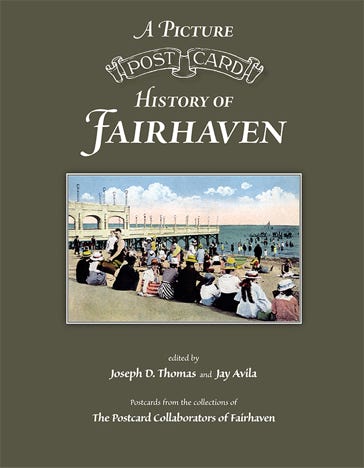
$22.00
Softcover
ISBN 978-0932027-757
120 pages • 8.5” x 11”
200 Photographs
A Picture Postcard History of Fairhaven is a pictorial treat serving up more than 200 favorite postcards drawn from the collections of The Postcard Collaborators of Fairhaven. Many of the postcards are one-of-a-kind photographs produced in the darkroom; others are popular views issued by postcard publishers. Together they comprise a medley of people, places, and events that paint a broad stroke of New England history.
In this high-quality, large-format book, postcards are reprinted in original size, in color and black & white, with several selected crossover enlargements. The collection is accompanied by text and captions that tell the history of the town from colonial settlements and American Revolutionary War battles, to the growth of business, industry and neighborhoods. There is a chapter devoted to the legacy of projects created by Henry Huttleston Rogers; and another showing the many incarnations of Fort Phoenix and its surrounding grounds. Fairhaven's proud seafaring heritage is duly noted with pictures and stories about her fishing industry, shipyards, wharves and bridges. You'll find harbor views, churches, schools, trains, trolleys, hurricanes and summer colonies. Stroll along her shady streets. Visit her beaches, monuments and pavilions. Marvel at her quaint historic homes and architectural splendor. Enjoy the picture postcard town of Fairhaven, Massachusetts.
Here's what some well-known Fairhaven visitors have written:
I never had a delightfuler holiday in my life and I did hate to leave Fairhaven.
--- Mark Twain to daughter Clara, July 1906
You will surely be a gainer by each day spent in the repose and charm of Fairhaven.
--- Henry H. Rogers to Mark Twain, June 1903
There is no other place on the New England coast that would give me the material for study such as sunsets, moonlights, storms, etc.
--- Charles H. Gifford, painter, to Fairhaven Star, September 1897
Oahu could not compare to Fairhaven in opulence. The natives were extremely lovely in appearance…kind and gentle by nature…always diligent in everything. It had become the custom of the country to be highly virtuous…
--- John Manjiro Nakahama, castaway, to his interrogators, Winter 1852